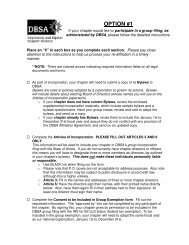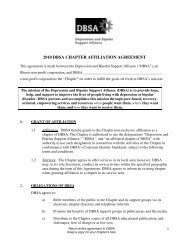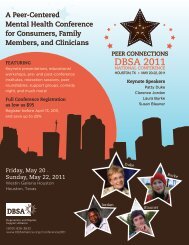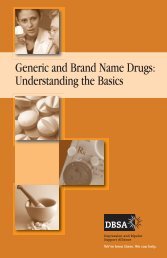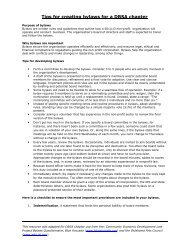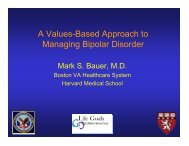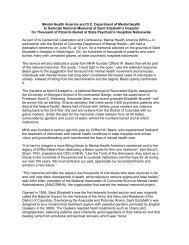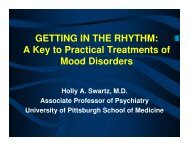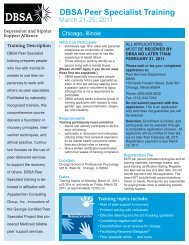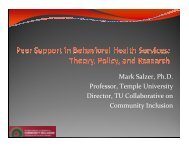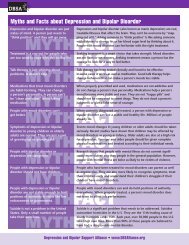The Power of Peers - Depression and Bipolar Support Alliance
The Power of Peers - Depression and Bipolar Support Alliance
The Power of Peers - Depression and Bipolar Support Alliance
Create successful ePaper yourself
Turn your PDF publications into a flip-book with our unique Google optimized e-Paper software.
DBSA<strong>The</strong> <strong>Power</strong> <strong>of</strong> <strong>Peers</strong>Allen Doederlein, DBSA PresidentLucinda Jewell, Ed. M., DBSA ChairChristy Beckmann, DBSA Treasurer
DBSAWhat makes DBSA unique? DBSA's tag line, "We've been there. We canhelp." is far more than a catchy slogan. DBSA is led by <strong>and</strong> created forindividuals living with mood disorders…<strong>and</strong> that experience informseverything that we do.DBSA is Peer-led: 50%+ <strong>of</strong> staff <strong>and</strong> board members live with a mooddisorder <strong>and</strong> all DBSA support groups are facilitated by peers Targeted: focuses solely on depression <strong>and</strong> bipolar disorder Nationally recognized: our peer specialist training services areacknowledged as some <strong>of</strong> the best in the nation—one <strong>of</strong> sixcurricula approved for use by the US Department <strong>of</strong> VeteransAffairs Innovative: <strong>of</strong>fering leading-edge interactive online resources Wellness-centered: informing, empowering, supporting, <strong>and</strong>inspiring individuals to achieve the healthy lives they want to lead
DBSA PRESENTATIONInformation <strong>and</strong> best practices…to informinternational efforts in patient advocacyMental Health NOWLucinda Jewell<strong>The</strong> Role <strong>of</strong> Family <strong>Support</strong> in AdvocacyChristy BeckmannEstablishing Peer-led <strong>Support</strong> GroupsAllen Doederlein
Mental Health NOWBringing Wellness toNeurodiversityLucinda Jewell, Ed. M.ChairDBSA National Board <strong>of</strong> Directors
WHO?Someone you know: At least 450,000,000 people in the worldlive with a mental health condition—rich, middleclass <strong>and</strong> poor,artists, teachers, students, scientists <strong>and</strong> politicians—yourfamily <strong>and</strong> friends.Even without modern diagnostics <strong>and</strong> treatment fordepression, Abraham Lincoln served as President <strong>of</strong> theUnited States <strong>and</strong> Winston Churchill as Prime Minister <strong>of</strong>Engl<strong>and</strong>.
WHERE?<strong>The</strong> stats you know:<strong>Depression</strong> is the no. 1 disease factor <strong>and</strong> 15% <strong>of</strong> the burden <strong>of</strong>illness in developed countries—more than all cancers combined.(WHO)26.2% <strong>of</strong> the U.S. has a mental health condition. (NIMH) Suicide is the no. 2 killer <strong>of</strong> 25-34 year-old Americans, <strong>and</strong> the no. 3killer for 10-24 year-olds. (CDC)WORLDWIDE, depression appears in the top ten disease factors <strong>and</strong>is on the rise. (WHO)
HOW?Largely missing is the recognition that many people successfullymanage their mental health issues.How would healthcare protocols <strong>and</strong> delivery be impacted?How would people with mental health conditions be seen <strong>and</strong> howwould they see themselves?
NOWValue people living with mood disorders: <strong>The</strong> conditions are not whowe are but how we temporarily feel, even as they have shaped <strong>and</strong>influenced our lives.Validate: No matter how we feel, we matter <strong>and</strong> make a difference inthe world.Invest in quality <strong>of</strong> life <strong>and</strong> wellness issues aligned as a singlecommunity—partners in mental health <strong>and</strong> wellbeing.Worldwide: it will take continued political will for holistic approachesto mental health management to become st<strong>and</strong>ard.
WHAT WOULD BE POSSIBLE?if mental health conditions were viewed as neurodiversity thatrequires effective management for responsible use?if mental health conditions were viewed as a necessary process <strong>of</strong>brain evolution rather than pathology?
MENTAL HEALTH NOWMood disorders are manageable, like diabetes, <strong>and</strong> wellness ispossible.PROCOVERY—proactive, present-based practices for wellness.Transform the conversation for mental health—Speak out, comeout, st<strong>and</strong> up, speak up. Together we can.
JUST TO NAME A FEWBuzz Aldrin—U.S. astronautParven Babi—Bollywood actressKjell Magne Bondevik—Former P.M. <strong>of</strong> NorwayTim Burton—English directorStephen Fry—English actorKay Redfield Jamison—U.S. scientist/writerPrimo Levi—Italian scientist/writerSinéad O'Connor—Irish singerGraeme Obree—Scottish cyclistPhilip Roth—U.S. writerJim Salinger—N.Z. climate change scientistMichael Slater—Australian cricketerStuart Sutherl<strong>and</strong>—English psychologistTed Turner—U.S. media mogulJ. Craig Venter—U.S. genome maverick
<strong>The</strong> Role <strong>of</strong> Family<strong>Support</strong> in AdvocacyChristy BeckmannImmediate Past Chair, TreasurerDBSA National Board <strong>of</strong> Directors
<strong>The</strong> Role <strong>of</strong> Family <strong>Support</strong>in AdvocacyClinical pr<strong>of</strong>essionals have limited contact withfamilies, leaving families <strong>and</strong> friends with unmetneeds <strong>and</strong> less able to be helpful for therecovery <strong>of</strong> their family member.Family <strong>and</strong> caregiver support groups meet thisneed <strong>and</strong> also advance advocacy.
<strong>The</strong> goal <strong>of</strong> family <strong>and</strong> friendssupport groups is to:Improve empowerment, knowledge <strong>and</strong> emotion-focusedcoping <strong>of</strong> family members.Reduce the anxiety <strong>and</strong> possibly depression experienced byfamily members <strong>and</strong> friends.Improve the functioning <strong>of</strong> family members with respect toproblem solving skills.Provide communication skills so that if non-recovery behaviorpresents, family <strong>and</strong> friends have communication options.
What do family <strong>and</strong> friendssupport groups do?Offer the lived experience <strong>of</strong> a person with a mood disorder; provideempathy.Offer a safe place for self-disclosure for family <strong>and</strong> friends.Share techniques for problem solving, empathetic listening, <strong>and</strong>communication.Share personal information about medications, side effects, <strong>and</strong>strategies for medication adherence.Offer information related to brain disorders <strong>and</strong> the most effectiveevidence-based treatment options that promote recovery.
What do family <strong>and</strong> friendssupport groups do?Acquire strategies for h<strong>and</strong>ling crisis <strong>and</strong> relapse.Focus on the caregiver’s coping skills for worry, stress, <strong>and</strong>emotional overload.Identify support <strong>and</strong> services within the community.Provide information on advocacy to improve <strong>and</strong> exp<strong>and</strong> services.Help family <strong>and</strong> friends cope with fears.
Are family support groups effective?YES.Study funded by the USA National Institute <strong>of</strong> Mental Health,University <strong>of</strong> Maryl<strong>and</strong> School <strong>of</strong> Medicine Study 2006—2009,showed that compared to control group*Reduced stress <strong>of</strong> participants.Significantly greater empowerment <strong>of</strong> family <strong>and</strong> friends.Significantly improved knowledge <strong>and</strong> information about mentalhealth.Significantly reduced worry.Reduced anxiety <strong>and</strong> distress.Improved family system functioning.*Based on FAD problem solving <strong>and</strong> COPE acceptance scales
What else does this mean?Fit Also with Qualitative Study<strong>The</strong> benefits are underst<strong>and</strong>able in terms <strong>of</strong> self-help theory,stress/coping <strong>and</strong> trauma/recovery models.Suggests that new info+support+skills=changes in awareness, moreactive coping, increased empowermentWhich helps reduce distress, improve family relating, <strong>and</strong> leads tobroader benefits.
What else does this mean?Lucksted, Stewart, Forbes, 2008
Some ConclusionsEvidence shows that peer family interventions enhance familyoutcomes.Peer-lead family programs are important in the tool kit to helpfamilies <strong>of</strong> people with mental heath diagnoses.Families <strong>and</strong> friends are excellent advocates.
What are some resources?<strong>Depression</strong> <strong>and</strong> <strong>Bipolar</strong> <strong>Support</strong> <strong>Alliance</strong>Mood Disorders Association <strong>of</strong> CanadaCanadian Mental Health AssociationCommunity Resource Connections <strong>of</strong> Toronto: www.crct.org<strong>Depression</strong> <strong>Alliance</strong> <strong>of</strong> the UKwww.FamilyAware.orgwww.MayoClinic.com/health/depressionMental Health America: www.nmha.orgNational <strong>Alliance</strong> on Mental Illness: www.nami.org
What are some resources?SAMHSA Consumer-Operated Evidence-Based Practice KitGuide provides tools for developing mental healthservices owned & run by people in recoveryNational Mental Health Consumers’ Self-Help Clearinghouse“Starting a Self-Help/Advocacy Group”“Stepping Up: A social inclusion action plan for mental healthreform 2007-2012”Report from South Australia’s Social Inclusion Board,plan for transforming the mental health system,emphasis on family, peers, <strong>and</strong> friends
Establishing Peer-led<strong>Support</strong> Groups:<strong>The</strong> DBSA ModelAllen DoederleinPresidentDBSA
WHY ATTEND A DBSASUPPORT GROUP?DBSA support groups provide the kind <strong>of</strong> sharing <strong>and</strong>caring that is crucial for a lifetime <strong>of</strong> wellness.“<strong>The</strong> members <strong>of</strong> my DBSA support group reached out to me <strong>and</strong> made merealize that I was not alone. If not for the support that I received from thisorganization, I probably wouldn’t be here.”— DBSA support group participant“I think the reason I was depressed for so long was that I felt excluded fromeverything, even my family. Finding people who accept you for who youare—I can’t put a price tag on that.”— DBSA support group participant
DBSA support group participants say that their DBSA groups*Provide a safe <strong>and</strong> welcoming forum for mutual acceptance, underst<strong>and</strong>ing,<strong>and</strong> self-discoveryGive them the opportunity to reach out to others <strong>and</strong> benefit from theexperience <strong>of</strong> those who have “been there”Motivate them to follow their treatment plansHelp them underst<strong>and</strong> that mood disorders do not define who they areHelp them rediscover strengths <strong>and</strong> humor they may have thought they hadlost*2000 DBSA support group survey <strong>of</strong> 2,049 people from 190 cities in 38 states<strong>and</strong> the District <strong>of</strong> Columbia
What benefits do DBSA support groups <strong>of</strong>fer?Benefits# <strong>of</strong> participants benefiting tosome or great extent Provide interpersonal support 98.2% Help to cope with problems/crises 96.7% Help to make better decisions 95.1% Help to underst<strong>and</strong> medications/treatment 93.7%*2000 DBSA support group survey <strong>of</strong> 2,049 people from 190 cities in 38 states<strong>and</strong> the District <strong>of</strong> Columbia
How can DBSA support groups help people maintain better mentalhealth?People who had been attending a DBSA group for more than a year wereless likely to have been hospitalized in the past 12 months.<strong>The</strong> longer people had attended a DBSA group, the less likely they were tohave stopped medication against medical advice, <strong>and</strong> the fewer barriers t<strong>of</strong>ollowing their treatment plan they experienced.More than half <strong>of</strong> the people who were not following their treatment planswhen they began attending their DBSA groups became more motivated todo so over time with continued group attendance*2000 DBSA support group survey <strong>of</strong> 2,049 people from 190 cities in 38 states<strong>and</strong> the District <strong>of</strong> Columbia
6 key elements <strong>of</strong> a DBSAchapter’s support group1. Peer-led2. Focus on self-help3. Safe & accepting4. Confidential5. Meet regularly6. Free <strong>of</strong> charge
DBSA chapters’ supportgroups are adjunctive<strong>The</strong>y are NOT1. <strong>The</strong>rapy or treatment2. A place to diagnose or a substitute for pr<strong>of</strong>essionalcare3. A 12-step group4. A “pity party”5. An expert giving a lecture
What does a person with a mood disorderneed to start a support group?1. A commitment to peer support2. <strong>Support</strong> <strong>of</strong> other people with mood disorders <strong>and</strong> familymembers/friends3. Meeting location4. Telephone number <strong>and</strong> email address5. Pr<strong>of</strong>essional support from a local advisor6. Responsibility to yourself
What does a clinician need to help her orhis patient start a support group?1. A belief in peer support2. An interested patient3. Ability to help with a meeting location4. Willingness to provide support as a pr<strong>of</strong>essional advisor5. Responsibility to your patients6. Responsibility to yourself
DBSA<strong>The</strong> <strong>Power</strong> <strong>of</strong> <strong>Peers</strong>Allen Doederlein, DBSA PresidentLucinda Jewell, Ed. M., DBSA ChairChristy Beckmann, DBSA Treasurer
June 13-16, 2013 Loews Miami BeachMiami Beach, FloridaImportant Dates – July 2012•Symposia & Concurrent Session Applications Open•Rapid Communications & Poster Presentation Proposal Applications Open•Lilly Young Investigator Fellowship in <strong>Bipolar</strong> Disorder Applications Openwww.10thbipolar.org



